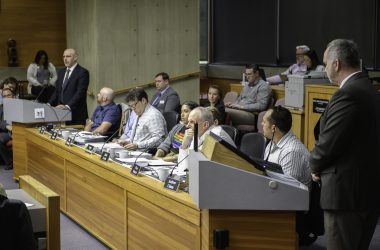 Sarah Kirk stands next to a high performance liquid chromotography system in her lab at Willamette University. Kirk will spearhead a research project funded by a grant from the National Institutes of Health to investigate treatment for a hereditary eye disease. (Amanda Loman/Salem Reporter)
Sarah Kirk stands next to a high performance liquid chromotography system in her lab at Willamette University. Kirk will spearhead a research project funded by a grant from the National Institutes of Health to investigate treatment for a hereditary eye disease. (Amanda Loman/Salem Reporter)
A Willamette University chemistry professor is getting a $425,000 federal grant to develop treatment for an eye disease that often leads to blindness.
Sarah Kirk has spent years studying retinitis pigmentosa, a hereditary disease that damages the retina, causing vision loss that typically starts in childhood. It affects about 1 in 4,000 Americans.
“Right now, they have no effective cure for this,” Kirk said.
Some treatment can slow the disease’s progress. But Kirk’s latest project, funded by the National Institutes of Health, focuses on improving and testing molecules that have shown promise in stopping the disease, work that could lead to much more effective help for those losing vision.
Over three years, she’ll bring 12 undergraduate students into her lab, giving them a chance to publish research early in their careers.
It’s the first NIH grant Willamette has ever won, a major accomplishment for Kirk, who has been at the university since 2002. She was “ecstatic” when she got the news earlier this month.
“When it seemed like the grant was going to happen, I still didn’t believe it,” she said.
Kirk’s work is focused on channels in the eye which allow some ions – substances like calcium and sodium – to pass through.
The channels, she said, are like a gated community, with chemicals in the body acting as keys that lock or unlock the gate, depending on what the eyes need to function. Normally, when the eye has enough calcium, chemicals in the body signal the channel to close.
But people with retinitis pigmentosa, those gates stop working correctly.
“Even when you don’t want the channel open, it’s open,” Kirk said. That leads to a buildup of too much calcium in the eye, which causes the rod and cone cells to die, gradually worsening vision as the disease progresses.
Kirk has worked since 2006 to create and improve molecules that can stop the disease’s progress, blocking the gate when needed to regulate the flow of calcium to the eye. Those molecules could form the basis of a drug to treat retinitis pigmentosa, returning the system to normal function.
Now, she’ll use the grant to tweak the molecules so they dissolve better in water, a feature that would let a future drug be administered via eye drop.
Then, the team she’s leading will test on mice the most promising molecules to see if they work as intended. She’s collaborating with researchers Lane Brown at Washington State University and Catherine Morgans at Oregon Health & Sciences University.
Kirk said she’s eager to include undergraduate students in her work. She attended Whitman College and participated in research there, which she credits with helping her realize she wanted to work in the lab.
“I learned in that mentored opportunity how much I enjoyed the problem-solving aspects,” she said.
While earning her doctorate, she decided she wanted to teach science to provide similar opportunities to students early in their careers “where I could help develop the next generation of scientists.”
“I firmly believe that we can do more by teaching more people how to really learn, how to do research and find the passion in it,” she said.
SUPPORT SALEM REPORTER’S JOURNALISM – A monthly subscription starts at $5. Go HERE. Or contribute to keep our reporters and photographers on duty. Go HERE. Checks can be sent: Salem Reporter, 2925 River Rd S #280 Salem OR 97302. Your support matters.
Contact reporter Rachel Alexander: [email protected] or 503-575-1241.

Rachel Alexander is Salem Reporter’s managing editor. She joined Salem Reporter when it was founded in 2018 and covers city news, education, nonprofits and a little bit of everything else. She’s been a journalist in Oregon and Washington for a decade. Outside of work, she’s a skater and board member with Salem’s Cherry City Roller Derby and can often be found with her nose buried in a book.









